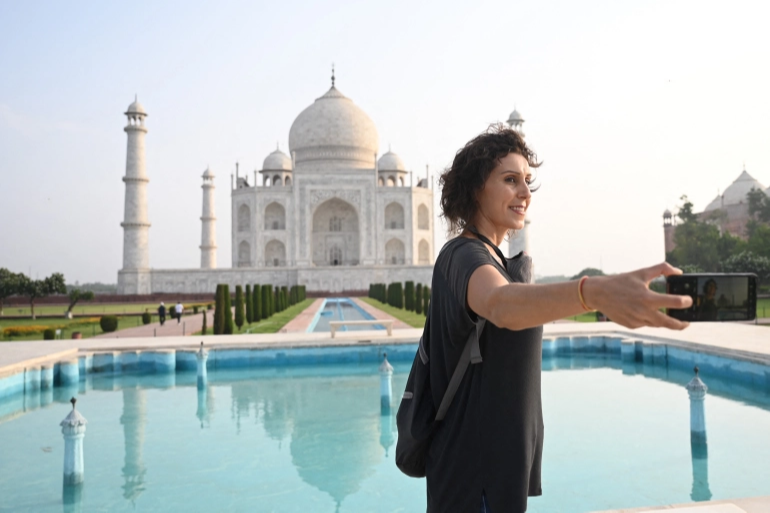
A tourist from Brazil at the Taj Mahal after it reopened to visitors following the easing of coronavirus restrictions in Agra [File: Money Sharma/AFP]
New Delhi, October 15 (RHC)-- India has reopened to fully vaccinated foreign tourists travelling on chartered flights in the latest easing of its coronavirus restrictions as infection numbers decline.
Foreign tourists on regular flights will be able to enter India starting from November 15, officials said on Friday. It is the first time India has allowed foreign tourists to enter the country since March 2020 when it imposed its first nationwide coronavirus lockdown.
It is unclear whether arriving tourists will have to quarantine but they must be fully vaccinated and test negative for the virus within 72 hours of their flight. The decision, announced earlier this month by India’s home ministry, comes as the country’s daily infections have dropped below 20,000 from a peak of 400,000 in May and more people have been vaccinated.
India has administered more than 970 million vaccine doses. Nearly 70 percent of the eligible adult population has had at least one dose. The easing of restrictions on foreign tourists visiting the country, however, coincides with India’s domestic tourist and festive season. Already, it has prompted concerns by health officials who have warned against complacency.
Earlier this month, the Indian Council of Medical Research, India’s premier medical body, cautioned that “revenge tourism” could lead to a surge in COVID-19 infections if tourists don’t strictly adhere to safety protocols.
According to official data, fewer than three million foreign tourists visited India in 2020, which was a dip of more than 75 percent as compared with 2019.
Meanwhile, a public-private partnership in India has made getting a COVID-19 test more affordable for many. Developing and building components of the gold standard RT-PCR test at home has enabled the country to stop relying on imports and ramp up testing during the second wave of the pandemic.
Scientists at India’s most advanced bioscience innovation labs, the Centre for Cellular and Molecular Platforms, or C-CAMP, in Bengaluru city, are working with local manufacturers to develop more affordable diagnostic technologies with financial support from The Rockefeller Foundation and help from the Indian government and Tata Consultancy Services.
Since many components of the real-time reverse transcription-polymerase chain reaction – or RT-PCR – test were not manufactured in India, the country relied on imports when the pandemic first emerged in early 2020.

